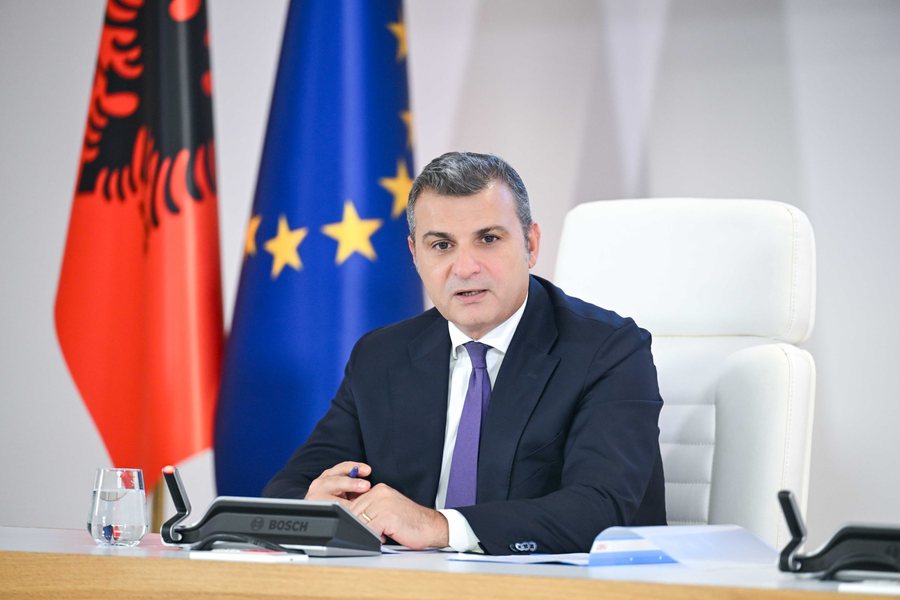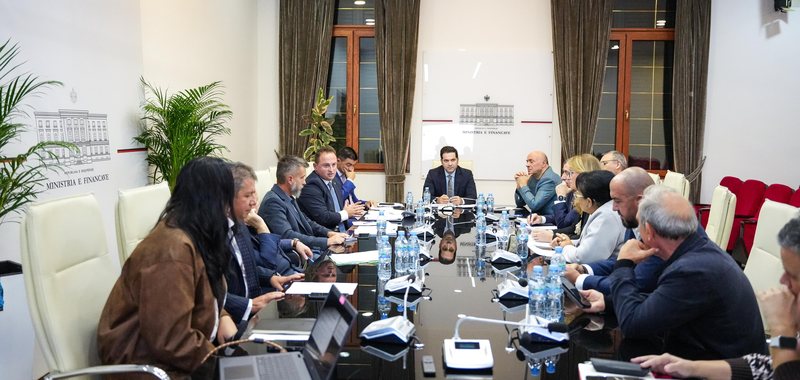“SEPA, gur themeli drejt infrastrukturës financiare evropiane” - Sejko: Faza e dytë, edukimi i përdoruesve dhe thellimi i digjitalizimit të pagesave

Kanë nisur zyrtarisht transaksionet e para me SEPA në Shqipëri. Në Bankën e Shqipërisë është mbajtur ceremonia e transaksionit të parë të vendit tonë në Tregun Unik të Pagesave në Euro.
Guvernatori i Bankës së Shqipërisë, Gent Sejko, u shpreh se ky nuk është thjesht një zhvillim teknik në sistemin e pagesave, por një gur themeli në rrugën e Shqipërisë drejt integrimit në infrastrukturën financiare evropiane.
“Rrugëtimi ynë ka kërkuar kohë, përkushtim dhe partneritet, dhe sot jemi krenarë që Shqipëria është pjesë e këtij sistemi unik evropian. Tani nis faza e dytë: shfrytëzimi maksimal i këtij standardi nga bankat dhe bizneset, edukimi i përdoruesve dhe thellimi i digjitalizimit të pagesave. Banka e Shqipërisë u bën thirrje bankave tregtare dhe institucioneve financiare që të promovojnë aktivisht shërbimet SEPA, të informojnë klientët për përfitimet konkrete dhe të investojnë në përmirësimin e mëtejshëm të platformave digjitale. Vetëm përmes bashkëpunimit dhe përkushtimit të të gjithë aktorëve, Shqipëria do të arrijë ta shfrytëzojë plotësisht potencialin e këtij integrimi historik”, tha Sejko.
Pjesëmarrja në SEPA nuk është thjesht një zhvillim teknik në sistemin e pagesave, por një gur themeli në rrugën e Shqipërisë drejt integrimit në infrastrukturën financiare evropiane.
“Nga sot, qytetarët shqiptarë do të mund të transferojnë para për në dhe nga BE-ja, si çdo qytetar tjetër i BE-së. Kjo do të thotë se ata do të kursejnë para, për shembull lidhur me dërgesat e emigrantëve; pagesat e bizneseve me Evropën do të jenë më të shpejta dhe më të lira; turistët do të mund të kryejnë pagesa elektronike më lehtë. Ky është një hap i rëndësishëm drejt një ekonomie më formale dhe digjitale, hap i cili do të nxisë njëherazi edhe tregtinë. Arritja e sotme dëshmon se kur angazhimet politike ndiqen me vendosmëri, ato mund të sjellin rezultate konkrete për qytetarët tanë. Gjithashtu, ajo dëshmon se BE-ja është partnere serioze në përmbushjen e detyrimeve sapo plotësohen kushtet e nevojshme”, u shpreh Ambasadori i BE, Silvio Gonzato.
Integrimi në SEPA e bën tregun tonë financiar më konkurrues, rrit besimin e investitorëve dhe e afron Shqipërinë me standardet më të larta të Bashkimit Evropian.

Më shumë gra shofere në rrugët e Shqipërisë/ Grupmosha 25-34 vjeç me numrin më të lartë të lejeve të drejtimi për të dyja gjinitë
Të kesh një makinë dhe leje drejtimi nuk po shihet më si luks, por si nevojë e domosdoshme veçanërisht për ata që jetojnë në kryeqytet dhe në qytetet e......

“Kemi shumë pak patenta për shpikje” - Laknori: Ligji i ri, më shumë standard dhe më pak burokraci
Në Shqipëri, numri i patentave për shpikje mbetet ende i ulët, një tregues i mungesës së mbështetjes financiare dhe institucionale për inovatorët shqiptarë.......

Greqia rrit shpenzimet me 5 miliardë euro në 2026 - Projektbuxheti parashikon zgjerimin e ekonomisë me 2.4% vitin e ardhshëm
Projektbuxheti i Greqisë për vitin 2026 parashikon një rritje të shpenzimeve prej 5 miliardë eurosh në krahasim me vitin 2025, kryesisht e nxitur nga......

Sa kushton të jetosh vetëm në Shqipëri? Dy të rritur me fëmijë shpenzojnë rreth 27 mijë lekë më shumë se dy të rritur pa fëmijë
Shpenzimet mujore për konsum në Shqipëri janë rritur gjatë vitit 2024 në të gjitha kategoritë e familjeve, duke reflektuar një rritje të lehtë të mirëqenies......

Gjobë 350 euro/m2 për ndërtimet pa leje dhe konfiskim - Fuqizohen masat, nis zbatimi. Kush përfshihet në “Listën e Zezë”
Kushdo që ndërton pa leje, apo në tejkalim të lejeve të ndërtimit, do të penalizohet. Qeveria ka miratuar aktet normative të cilat kanë hyrë në fuqi vendosin......

Tkurret parashikimi i energjisë së rinovueshme - IEA redukton projeksionin e rritjes globale me 900 GW deri në vitin 2030
Agjencia Ndërkombëtare e Energjisë (IEA) uli parashikimin e saj global për rritjen e kapacitetit të energjisë së rinovueshme deri në vitin 2030 me 900......

BE, ulen vendet e punës në industrinë diellore - Punësimi pëson tkurrje për herë të parë në dekadën e fundit
Punësimi në industrinë diellore të Bashkimit Evropian arriti një nivel rekord vitin e kaluar, por po pëson rënie në vitin 2025. Megjithatë, tkurrja e vendeve......

“Sigurimi i detyrueshëm i banesave nga tërmetet” - Zhvillohet takimi konsultativ me grupet e interesit!
Ministria e Financave zhvilloi sot një takim konsultativ me grupet e interesit mbi projektligjin “Për sigurimin e detyrueshëm të banesave nga tërmetet”.......

















